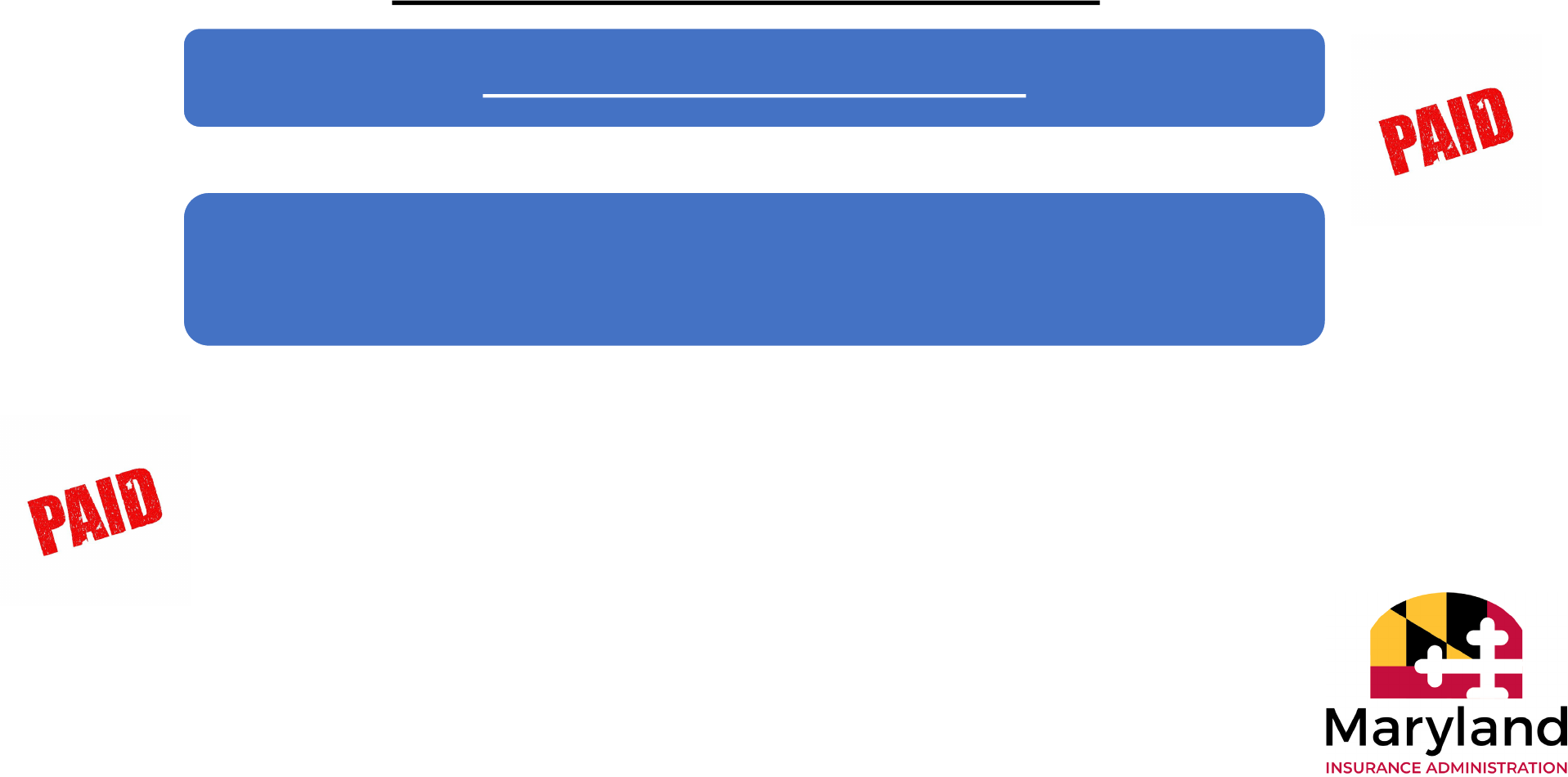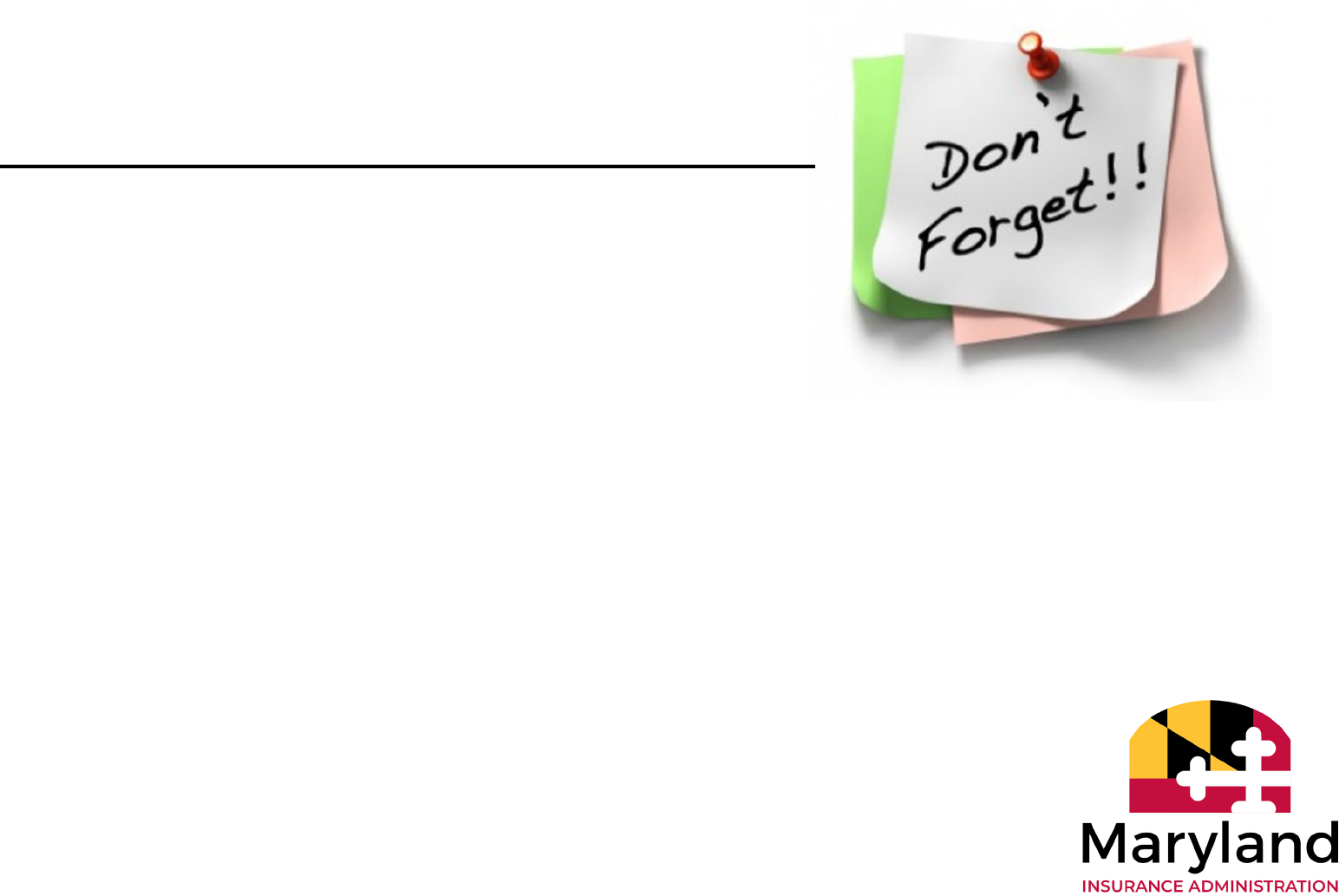
Agenda: Life Insurance
• Introduction to the Maryland Insurance
Administration
• Types of Life Insurance
• Frequently Asked Questions
• Shopping Tips
• Viatical Settlements
• Finding a Missing Policy
• Additional Resources
• Contact Us
2

What is the Maryland Insurance Administration
The Maryland Insurance Administration (MIA) is
the state agency that regulates insurance in
Maryland. The MIA:
Licenses insurers and insurance producers
(agents or brokers).
Examines the business practices of licensees to
ensure compliance.
Monitors solvency of insurers.
Reviews/approves insurance policy forms.
Reviews insurance rates to ensure rates are not
inadequate, excessive or unfairly discriminatory.
Investigates consumer and provider complaints
and allegations of fraud.
Video: How the MIA can help

What is the Maryland Insurance Administration?
If you feel that your insurer or insurance producer acted improperly, you have
the right to file a complaint. Examples of improper actions include:
• Improperly denying or delaying payment of all or portions of a claim;
• Improperly terminating your insurance policy;
• Raising your insurance premiums without proper notice;
• Making false statements to you in connection with the sale of insurance or
processing of insurance claims; and,
• Overcharging you for services, including premium finance charges.

Types of Life Insurance
Many people purchase life insurance (and
annuities) to provide security for themselves
and their loved ones. Your need for life
insurance varies with your age and your
financial responsibilities. All policies are not
the same. Some provide coverage for your
lifetime and others cover you for a specific
number of years. Some build up cash values
and others do not. Let’s look at the different
types of life insurance.

Term Insurance
• Term insurance covers you for a term of one or more
years.
• It pays a death benefit only if you die during that term.
• Term insurance generally offers the largest insurance
protection for your premium dollar, but generally does
not build up cash value to use in the future.
• Generally, term insurance offers lower premiums in
early years but premiums may increase as you get
older.
Types of Life Insurance

Permanent Insurance
• Permanent insurance (which includes types such
as universal life, variable universal life and whole
life) provides long-term financial protection. These
policies include a death benefit and, in some cases,
cash savings. Because of the saving element,
premiums tend to be higher.
Types of Life Insurance

Permanent Insurance
• Whole Life – Fixed premium payments, guaranteed death
benefit and cash value growth.
• Universal Life – Premium payments may be flexible or
fixed. Provides guaranteed death benefit as long as your
policy is in effect. A minimum guaranteed interest rate is
credited to the cash value.
Types of Life Insurance

Permanent Insurance
• Indexed Universal Life – Like Universal Life, premium
payments may be flexible or fixed and the death benefit is
guaranteed as long as your policy is in effect. Interest credited
to the cash value is linked to an external index, such as the S&P
500.
• Variable Universal Life – A category of Universal Life, that
offers flexible or fixed premiums, but the cash value is tied to the
performance of one or more investment accounts, similar to
mutual funds. The policy owner chooses the investment
accounts. As with any investment products, the value of your
investments may vary over time, and may in turn cause your
death benefit and/or cash value to increase or decrease.
Types of Life Insurance

Consumer Advisory - Universal Life Insurance
• A Universal Life insurance policy is a type of permanent
insurance with a flexible or fixed premium. You choose the
premium you pay. There is a minimum required premium at
issue.
• Part of your premium pays for the expense charges and any
remaining funds are put in the cash value of your policy.
Your cash value will earn interest at the interest rate in
effect for that year (as declared by the company annually).
This interest rate will equal or be more than the guaranteed
interest rate stated in the policy.
Types of Life Insurance

Consumer Advisory - Universal Life Insurance
• All expense charges, such as cost of insurance charges and
surrender charges, are stated in your contract.
• As you get older, your cost of insurance charges
increase. If your planned premium isn’t enough to cover
monthly deductions, additional premiums will be required
to keep your policy in force.
Types of Life Insurance

Consumer Advisory - Universal Life Insurance
If you bought your policy a while ago, you may have selected the amount
of premium you intended to pay based on the interest rate in effect at the
time. Since interest rates have changed through the years, you may not
be getting the same rate of return illustrated at the time of sale, especially
if the interest rate was higher than it is now. Based on the current
declared interest rate, you may be required to pay additional premiums.
Sometimes people reduce the death benefit to avoid paying higher
premiums, or to make the payments more affordable. If you are
considering lowering the death benefit, it is a good idea to consider your
current and long term financial needs. You may also want to consult with
a financial advisor.
Types of Life Insurance

Can someone else take out a policy on my life?
• Yes, but a stranger cannot buy a policy to insure your life
in Maryland. To buy a policy insuring someone else’s life,
certain conditions must be met.
Frequently Asked Questions

What conditions must be met before someone can take a policy
out on my life?
• Although there are some exceptions, if it is not a group policy,
generally the person whose life is to be insured must:
• be legally competent to enter a contract; and
• apply for or consent in writing to the policy unless an
exception applies.
Frequently Asked Questions

What conditions must be met before someone can
take a policy out on my life (con’t)?
• Additionally, the benefits must be payable to you, your personal
representative, or someone who has an insurable interest in
your life unless
the policy is to be purchased by a charitable,
benevolent, educational, governmental or qualified religious
institution, or a qualified trust for the benefit of such an
institution. If the policy is to be purchased by one of the listed
types of entities, you or your legal representative must designate
the entity as the irrevocable beneficiary of the insurance policy.
• An insurable interest is required to obtain a life insurance
policy on another.
Frequently Asked Questions

When can someone buy a policy on my life without my
consent or me signing the application?
• If the purchaser is your spouse.
• You lack the legal capacity to consent to life insurance
and the person purchasing the policy has an insurable
interest in your life.
• A parent, stepparent, or spouse is purchasing a family
policy that insures two or more family members; or
• The person to be insured is a minor, and the purchaser
either has an insurable interest in the life of the minor,
or the minor is dependent upon the person for support
and maintenance.
Frequently Asked Questions

Who has an insurable
interest in my life?
• People with an
“insurable interest” in
your life generally
includes you and
individuals closely
related by blood or law
to you, such as a spouse
or children. But others,
such as your employer
or business partner
might also have an
insurable interest.
Must my beneficiary have
an insurable interest?
• No. If you buy a policy
on your own life, you
become the owner of the
policy. As the owner, you
can name anyone as
beneficiary, including
your estate, a family
member, a charity,
friend, or a stranger.
Frequently Asked Questions

What about companies that advertise “no physical exam?”
• The insurance may be more expensive than if the company required
a physical. Although there is no physical, you will probably have to
answer a few, broad health questions on your application.
Frequently Asked Questions

Some life insurance ads claim “you can not be turned down.”
What’s the catch?
• Such ads are referring to “guaranteed issue” policies, where the company
asks no health history questions. The company knows it is taking a risk
because people with bad health could buy their policies. The company
may balance the risk by charging higher premiums or by limiting the
amount of insurance you can buy. Sometimes the premiums can be almost
as much as the insurance benefit to be paid to the beneficiary. Be sure you
clearly understand the policy you are purchasing, and remember to speak
with an advisor if you do not.
Frequently Asked Questions

Term Life Insurance
Why is term life insurance often called “temporary” insurance?
• Insurance producers
sometimes refer to term
insurance as “temporary”
because the policy only lasts
for a specific period.
Frequently Asked Questions

Term Life Insurance
What do I get when I buy term life insurance?
• You have bought and
received the company’s
guarantee that if you die
during the term of the
policy, it will pay a death
benefit to your beneficiary.
Frequently Asked Questions

Term Life Insurance
Do I get any benefit if I don’t die during the term of my policy?
• The policy will not pay any
benefits
Frequently Asked Questions

Permanent Life Insurance
I understand my permanent policy would be “fully
paid up” at age 65. What does that mean?
• This means that you have made enough premium payments to
cover the cost of insurance for the rest of your life. The company
plans to use the cash value to pay premiums until you die. If you
take out the cash value, there may not be enough to pay
premiums.
Frequently Asked Questions

Permanent Life Insurance
What happens to the cash value in my policy when I die?
• It depends upon the terms of your policy, always read the terms of any
life insurance policy carefully. Under the terms of some policies, when
you die, the insurer will pay only the death benefit no matter how
much cash value you may have had in the policy the moment before
you died. But some whole life policies pay both the death benefit and
the cash value when you die. It is important to remember though that
whether your policy pays only a death benefit, or also the cash value,
any loans (including interest) taken out against the policy that you
have not repaid will be subtracted from the death benefit. The result is
that your beneficiary could wind up with less than the face amount of
the policy.
Frequently Asked Questions

Permanent Life Insurance
An insurance producer has suggested that I buy term instead of
whole life. Does it make sense to buy term and invest the difference?
• It depends upon your circumstances. Factors to consider can include:
• as you get older, term premiums increase;
• by investing the difference, you could use your investment to pay the higher
cost of insurance in the future; and
• if your health deteriorates, you may not be able to buy a new policy.
• You may wish to consult a financial advisor when making this decision.
Frequently Asked Questions

Factors you may want to consider when shopping for a
policy
• Determine what you want the life insurance to do:
• Is it to pay burial expenses?
• Will the death benefit be used to offset the
income you previously provided?
• How much coverage will you need?
• How much can you afford?
Shopping Tips

Factors you may want to consider when shopping for a
policy
• Is it possible the premium will increase, and if so,
will you be able to afford it in the future?
• Does this policy require medical underwriting?
This may include answering a series of health-
related questions and may include a medical exam.
• Does the policy include a waiting period?
Shopping Tips

Factors you may want to consider when shopping for a
policy
• Are you considering canceling an existing policy?
Make sure you understand the consequences of
canceling your current policy.
• Understand the policy you are purchasing. Talk to
a trusted family member or professional if you are
unsure if the policy makes sense for you.
Shopping Tips

Once you have purchased your policy,
place a current copy of your policy with
your will or estate paperwork in a safe
place where your family or beneficiaries
will look for it and have access. And most
importantly, make sure your loved ones
know where they can find the policy.
Shopping Tips

Insurance Fraud
Seniors are often targets of insurance fraud,
particularly in regard to life
and health insurance.
Be wary of a salesperson or telephone caller who:
• Contacts you unsolicited. The salesperson probably has
obtained your information through a mailing list.
• Uses high-pressure tactics. Common tactics include offering
a “last-chance deal,” or “limited offer” or attempting to
pressure you to sign forms without reviewing them.

Insurance Fraud
Seniors are often targets of insurance fraud,
particularly in regard to life
and health insurance.
Be wary of a salesperson or telephone caller who:
Urges you to cash in an existing annuity or life insurance policy to buy a
new annuity, life insurance policy, or other investment. Generally,
annuities and life insurance are worth more the longer you keep them.
Changing to a new annuity or policy may cause you to lose money over
the first three to five years. You also may be charged a penalty if you
withdraw money from your annuity early. Discuss the tax consequences
of early withdrawal with your tax advisor.

Insurance Fraud
Seniors are often targets of insurance fraud,
particularly in regard to life
and health insurance.
Be wary of a salesperson or telephone caller who:
Claims to be from Medicare, Social Security, or another government
agency. An insurance producer or broker who claims to be
associated with the government is breaking the law.
Wants to sell you a package policy that includes several different
benefits, some of which duplicate a policy you already have or
include coverage you do not need.

You are encouraged to report insurance fraud
activities to the Maryland Insurance Administration's
Insurance Fraud Division. You need not give your
name. Simply call 1-800-846-4069. Consumers may
also email fraud referrals by sending completed
forms to
fraud_referrals.mia@maryland.gov.
Insurance Fraud

Viatical Settlements
A viatical settlement is a written
agreement for the sale of a life
insurance policy to a third party. The
owner or certificate holder of the life
insurance policy (the viator) sells the
policy for an immediate cash
benefit.

Viatical Settlements
At one time, most viatical settlements were
for people with a life-threatening illness.
Now, individuals who are not facing a
health crisis may sell their life
insurance policies to obtain cash.
For more information, including consumer
tips and questions to ask, read our
brochure at:
https://insurance.maryland.gov/Consumer
/Documents/publications/viatical.pdf.

Finding a Missing Policy
Video: Locating a Missing Life Insurance Policy or Annuity
Contract
1. Check bank accounts and bills for evidence of an existing
policy.
2. Check safety deposit boxes and online accounts. If you
located a policy with contact information, you may contact
the insurer directly. If you are missing contact information
for the insurer, or the company is no longer in business,
please contact the Maryland Insurance Administration for
assistance at 800-492-6116.

Finding a Missing Policy
If your search has not uncovered any leads, the National
Association of Insurance Commissioners can help you. This
service is free of charge.
Link: NAIC Policy Locator
https://eapps.naic.org/life-policy-locator
Make sure you have as much information as possible. The
insured’s legal name, birthdate, death date, and Social
Security number are required. Submitting previous legal
names and addresses will allow the companies to conduct a
more accurate search of their records. Anyone who believes
they are a beneficiary, next of kin, or representative can
request this information.

Final Note – Life Insurance
It is important that you understand the life insurance
policy you own, or are considering purchasing.
Contact your insurer or insurance producer for advice if you
don’t understand the policy
It is a good idea to:
read your policy, and to review any updates or changes made
to your policy carefully; and
to review all statements carefully. If you find your statement
confusing, please don’t toss it out or file it away until you’ve
spoken to your insurer or insurance producer and thoroughly
understand your statement.
38

Additional Resources
Consumer Guide to Life Insurance
https://insurance.maryland.gov/Consumer/Documents/publications/life
insurance.pdf
Consumer Guide to Life Insurance - Spanish
https://insurance.maryland.gov/Consumer/Documents/publications/life
insurancespanish.pdf
Life Insurance for Military Personnel
https://insurance.maryland.gov/Consumer/Documents/publications/mil
itaryinsurance.pdf
Information about pre-burial needs from DLLR
http://www.dllr.state.md.us/license/cem/cemtips.shtml

Questions?
patricia.dorn@maryland.gov


